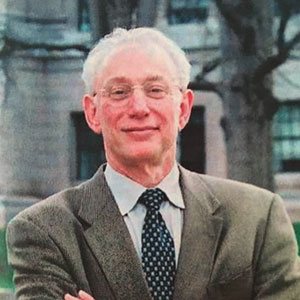From Vision to Impact: Frank Andrews Celebrated for Transforming Institutional Education in West Virginia
From Vision to Impact: Frank Andrews Celebrated for Transforming Institutional Education in West Virginia
By Stephanie Koons
UNIVERSITY PARK, Pa. — Frank Andrews was 17 years old and sitting quietly in church when the tears started to fall.
"I didn’t know what was going to happen to me," he recalled. "I was a very severe stutterer, and I didn’t know what would become of my life."
That moment of uncertainty marked the beginning of a path that would ultimately change thousands of lives — including his own.
Now, nearly six decades later, Andrews has been named the recipient of the 2025 Alumni Excellence Award from Penn State’s College of Education. A 1967 Penn State graduate with a degree in speech pathology and audiology, Andrews dedicated more than 50 years to education, spending the majority of his career serving marginalized students in prisons, juvenile facilities, and child care and mental health institutions across West Virginia.
"This honor is really the capstone of my career," Andrews said. "I applied because I wanted to thank Penn State. Without them — and without the Pennsylvania Office of Vocational Rehabilitation — I never would have gone to college. I’ve tried to pay that back my entire life."
A Second Chance, and a Beginning
Before Andrews was ever a Penn State student, he was a client at the University’s residential stuttering clinic, referred by a teacher at Albert Gallatin High School. At the time, the program accepted only a few dozen participants statewide, and its therapy regimen was intense: six hours a day of individual and group work.
Midway through the program, Andrews asked for permission to take a calculus course. He earned an "A."
That single grade changed his life.
"The Pennsylvania Office of Vocational Rehabilitation offered to pay my full tuition at Penn State for four years," he said. "I was thrilled — I had no way to go to college otherwise."
After earning his bachelor’s degree, Andrews went on to complete a master’s program at the University of Wisconsin and then began his educational career by working in Detroit’s inner-city schools. That experience deepened his commitment to serving disadvantaged communities. Eventually, he returned to Wisconsin to begin doctoral work but was later hired by the West Virginia Department of Education, where his long journey in public service would take root. While working full-time, Andrews would earn two additional degrees from Marshall University in public administration and educational administration.
Building a School System Behind Walls

In 1989, after years spent working in special education, Andrews was appointed superintendent of the newly formed Office of Institutional Education Programs. His task was monumental: build, from scratch, a statewide school system serving students in correctional and institutional settings — juvenile detention centers, child care and mental health facilities, and adult prisons.
What began as six schools grew to 41 institutions under Andrews’ leadership. At its peak, the program served more than 6,000 students per year.
"We promised each other that we would develop an organization that transformed people’s lives through education," Andrews said of the team he led. "It became a mission."
One of his most vivid memories is from that first year:
"I called our first principals’ meeting, and one of the six couldn’t make it — his mother had just died. That night, I found out the funeral home was about an hour from where we were meeting, so I went. When I introduced myself, he didn’t say a word. He just threw his arms around me and cried."
That moment, he said, taught him more about leadership than any textbook ever could.
"I learned the power of presence, of showing up and caring about your staff. That principal would have done anything for me from that day forward."
Data-Driven, Student-Focused
While Andrews is quick to deflect personal praise, his impact is measurable. His office implemented data-driven strategies, curriculum reform and staff development practices that are still in place today. He pushed for accreditation for institutional schools and advocated fiercely for the integrity of education in environments where it was often undervalued.
"In a traditional school district, people are behind education," he said. "But in a correctional system, they often weren’t. We had to convince tough people that we could be a positive influence. Study after study shows that education reduces recidivism, increases employment and improves lives."
Among his proudest moments were the graduation ceremonies — inmates dressed in caps and gowns, earning GEDs and certificates in front of tearful loved ones.
"The hugs I got from those family members — that told me I did a good job," Andrews said.
Lifting Up Forgotten Populations

Even after his retirement in 2006, Andrews wasn’t done.
A year before stepping down, he was asked to conduct a study on educational outcomes for children in foster care in West Virginia. The results were stark.
"These children scored lower than any other subgroup under No Child Left Behind," he said. "The more schools they attended in a year, the worse their performance."
His study, "Reaching Every Child," was the first in the country to cross-reference education data with child welfare agency records according to the American Bar Association. As a result, West Virginia implemented a statewide system to support foster youth academically, including the employment of educational recovery specialists and transition support teams.
"Now, we help kids in foster care get up to speed, transition between placements and stay connected to their education," Andrews said. "It’s one of the things I’m most proud of."
Honoring Mentors and Paying It Forward
Throughout his career, Andrews made it a point to learn from others. He regularly attended national correctional education conferences, befriending thought leaders and inviting them to West Virginia to consult. He served on national committees and helped deinstitutionalize children with disabilities, transitioning them from mental health institutions into community schools.
"I learned so much from others," he said. "And I tried to apply everything I could to make our system better."
A Hometown Legacy
Andrews’ values were shaped early on in Masontown, Pennsylvania — a small town of 5,000 near Uniontown — in the 1950-60s.
"We were children of immigrants — Italian, Polish, you name it," he said. "That town produced lawyers and judges, engineers, nurses, educators, successful business people, and many other types of professionals. We even won the Pennsylvania State Little League championship in 1954 and a number of regional football championships."
What drove it all, he said, was competition and the values that our parents and the community instilled in us.
"Competition brings out the best in people," he said. "And it drove me, too. I wanted our programs to be the best in the country."
Looking Ahead
Although newly connected again with Penn State’s Alumni Association, Andrews said he hopes to remain involved with the College of Education moving forward.
As for advice to future educators?
"Always protect the integrity of education," he said. "That was drilled into me early, and it stayed with me. Education changes lives — even behind walls."
Frank Andrews received the Alumni Excellence Award at the 2025 Penn State College of Education Alumni Society Awards Banquet in recognition of his extraordinary contributions to institutional education and advocacy for underserved students. He also was the recipient of the Lewis Hine Award in 2005, an award given annually to one of five professionals in the nation by the National Child Labor Committee for unheralded and exceptional service to young people and a Lifetime Achievement Award in 2011 by the Correctional Education Association.
____________________________________________________________________________

